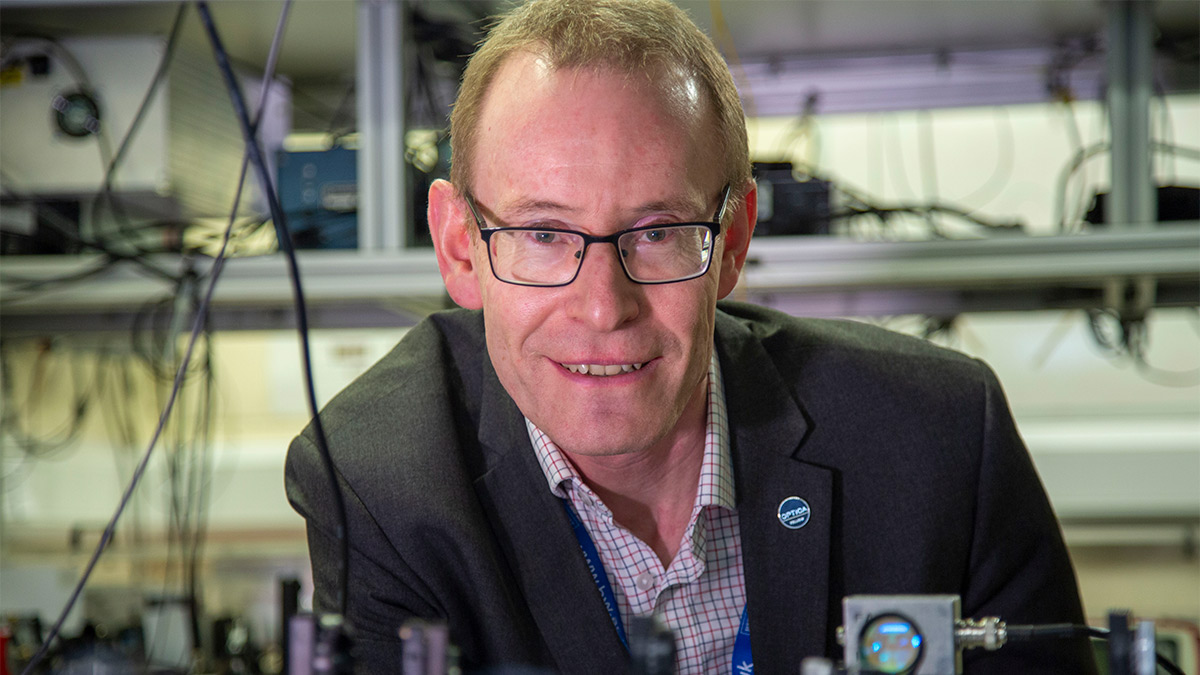Published:

Heriot-Watt University is part of a new consortium which has won almost £5m in funding to support the aim of tripling of the photonics sector across Scotland's central belt.
Led by the Universities of Glasgow and Strathclyde, the consortium also includes the University of St Andrews and has secured £4.7m funding from the Engineering and Physical Sciences Research Council (EPSRC), the main funding body for engineering and physical sciences research in the UK.
Photonics – the science of light – is central to many modern technologies, from the fibre-optic cables which carry internet data to the lasers which treat cancers and enable the fabrication of integrated circuits. Developments in photonics help spur advances in sectors including electronics, communications, medicine and the life sciences.
We're excited by the opportunities provided by this award to maximise the impact of Scottish photonics research in so many different ways.
Photonics expertise
The UK's photonics industry currently has a turnover of £14.5bn and employs 77,000 people – more than twice as many as the pharmaceutical industry. More than £1bn of that turnover is created in Scotland's central belt, which is widely recognised as a world leader in academic and industrial expertise in photonics.
Together, researchers at the consortium's four partner universities account for £95m of funding in photonics and quantum technologies, a quarter of the UK's total funding in the sector.
Over the next four years, the partner universities will work with companies in Central Scotland to accelerate the transfer of photonics research from the laboratory to tomorrow's photonics products – working with existing companies and encouraging the foundation of startups.
They will also help to grow the base of skilled workers to ensure that the sector is not constrained by the limited availability of staff trained in photonics technologies, and work on outreach projects to raise awareness of the opportunities available in photonics careers and entrepreneurship.
Scottish photonics opportunity
Professor Derryck Reid, a photonics specialist at Heriot-Watt University's Institute of Photonics and Quantum Sciences, said: “We're excited by the opportunities provided by this award to maximise the impact of Scottish photonics research in so many different ways, from public engagement of all ages, to developing early-career researchers and creating new high-tech spin-out companies.”
Professor Andy Harvey, the consortium's principal investigator at the University of Glasgow's School of Physics & Astronomy, said: “Scotland's central belt is already a photonics powerhouse, and has been identified in the Scottish Government's National Strategy for Economic Transformation as an area of opportunity for growth. The UK Government has also announced £1bn in new finding for quantum and photonics technologies, with £2.5bn more to follow in the years to come.
“This funding will help unlock further advances in the sector across central Scotland by creating new jobs, building new skills, attracting investment in new and existing companies, and inspiring people to take up careers in the sector.”
World-leading research
Professor Jennifer Hastie, Director of the University of Strathclyde's Institute of Photonics, is the consortium's deputy principal investigator. She said: “We have fantastic photonics capability in the central belt of Scotland, at universities and in industry, and an innovative, world-leading research cohort, yet in many ways it's a ‘hidden economy' of which we want to increase awareness, particularly among the next generation, and this new consortium will be ideally placed to achieve this.”
UK Science Minister, George Freeman, said: “As a nation with a rich history of innovation, Scotland can be central to boosting the UK's photonics industry, which is so vital to our economic prosperity and wellbeing – from transmitting information to developing medicine.
“Our £4.7m investment will further grow this already booming industry – worth £14.5bn – and alongside our separate £2.5m project to accelerate community healthcare in Tayside, will create new jobs that drive the Scottish and wider UK economy.
Strengthening photonics clusters
The consortium is called A Place-Based IAA in Photonic Technologies in Scotland's Central Belt and is funded through a new EPSRC scheme called Place Based Impact Acceleration Account (PBIAA).
The funding provides flexible support to research organisations, enabling them to drive impacts from their research portfolio through a wide range of activities, with the aim of driving regional growth.
Consortia leading the projects have been awarded a total of £41m by EPSRC, with project partners committing a further £7.8m. EPSRC is part of UK Research and Innovation – the UK's national funding agency for investing in science and research.
Professor Miles Padgett, Interim Executive Chair at EPSRC, said: “I'm pleased to announce our first ten Place Based Impact Acceleration Accounts, which will play a unique role in enhancing the capabilities of innovation clusters across the UK. A key priority for UKRI is to strengthen clusters and partnerships in collaboration with civic bodies and businesses, thereby driving regional economic growth.”
Alongside the four universities, the Scottish consortium is also supported by Glasgow City Council, Scottish Enterprise, CENSIS, City of Edinburgh Council, Fraunhofer UK Research Ltd, Fife Council, , Glasgow Science Centre Ltd, National Physical Laboratory, , SPIE, Technology Scotland and West Lothian Council.
Read more about our £2.5 million Accelerating Impact of Community healthCarE in Tayside project.